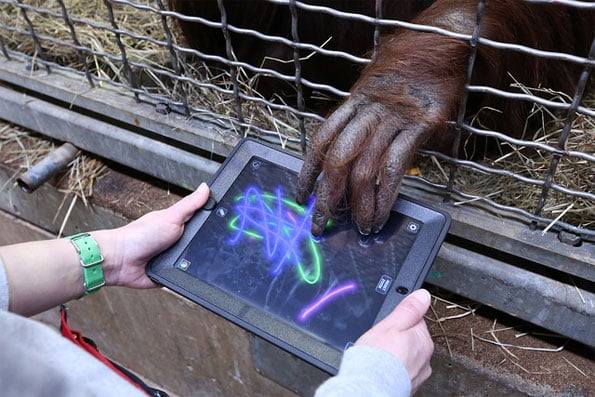High Tech Playtime: Apps for Apes Program Provides iPads to Orangutans
Great ape keepers at the Smithsonian's National Zoo found themselves inspired by an "Apps for Apes" program that's been implemented in a dozen zoos around the world, and so they decided to try it out with their six orangutans. Each orangutan is able to interact with an iPad tablet, though only if they show interest. It's not required that they spend time tapping the touchscreen, though many of them seem to be enjoying the experience, such as 36-year-old Bonnie who likes to bang on the drums.
"Apps for Apes fits perfectly in this new era of zoo keeping," said Becky Malinsky, great ape keeper at the National Zoo. "It's about changing up the day-to-day lives of our animals. We already vary their food, toys and social interactions every day, but the iPad offers another way to engage their sight, touch and hearing."

Image Source: Flickr (Smithsonian's National Zoo)
The National Zoo began participating in the program last year when a keeper's family member donated an iPad to the Great Ape House. More than 10 apps are now in use, including ones that feature musical instruments, cognitive games, drawing programs, and more. At some point, the National Zoo wants to try connecting its orangutans with those at other zoos using Apple's FaceTime videoconferencing application.
"Primarily, we want the Apps for Apes program to help people understand why we need to protect wild orangutans from extinction," said Richard Zimmerman, founding director of Orangutan Outreach. "We do that when we show Zoo visitors how similar humans and apes are, be it through observation, talking with wildlife experts or seeing the apes use the same technology we use every day."
Sadly, scientists estimate that the number of wild orangutans has decreased by 80 percent during the past 75 years. A big reason why is because humans have cleared out land that was originally orangutan territory in Indonesia in order to meet the growing demand for palm oil products, fast-growing pulp wood, and food crops, the National Zoo says.
If you have a soft spot for orangutans, you can learn more and/or donate funds by visiting the Orangutan Outreach website.
"Apps for Apes fits perfectly in this new era of zoo keeping," said Becky Malinsky, great ape keeper at the National Zoo. "It's about changing up the day-to-day lives of our animals. We already vary their food, toys and social interactions every day, but the iPad offers another way to engage their sight, touch and hearing."

Image Source: Flickr (Smithsonian's National Zoo)
The National Zoo began participating in the program last year when a keeper's family member donated an iPad to the Great Ape House. More than 10 apps are now in use, including ones that feature musical instruments, cognitive games, drawing programs, and more. At some point, the National Zoo wants to try connecting its orangutans with those at other zoos using Apple's FaceTime videoconferencing application.
"Primarily, we want the Apps for Apes program to help people understand why we need to protect wild orangutans from extinction," said Richard Zimmerman, founding director of Orangutan Outreach. "We do that when we show Zoo visitors how similar humans and apes are, be it through observation, talking with wildlife experts or seeing the apes use the same technology we use every day."
Sadly, scientists estimate that the number of wild orangutans has decreased by 80 percent during the past 75 years. A big reason why is because humans have cleared out land that was originally orangutan territory in Indonesia in order to meet the growing demand for palm oil products, fast-growing pulp wood, and food crops, the National Zoo says.
If you have a soft spot for orangutans, you can learn more and/or donate funds by visiting the Orangutan Outreach website.

